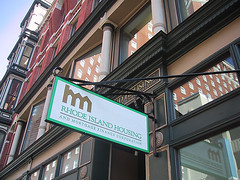Rhode Island group urges economic development that capitalizes on revitalization opportunities

Posted March 27, 2009 at 1:37PM
Grow Smart Rhode Island, headed by my friend Scott Wolf, has urged its state to place more focus on attracting small- to medium-sized companies interested in transit-friendly centers and properties available for revitalization. The state should spend less time recruiting companies that seek vast, auto-dependent greenfield sites, according to the group.
 A nonprofit coalition of community and civic leaders that promote sustainable growth and development, Grow Smart pointed out that most of the state's recent economic development success stories - even during the recession - have involved companies with high wage jobs moving to rehabbed historic buildings in urban and town centers. The group provides some examples:
A nonprofit coalition of community and civic leaders that promote sustainable growth and development, Grow Smart pointed out that most of the state's recent economic development success stories - even during the recession - have involved companies with high wage jobs moving to rehabbed historic buildings in urban and town centers. The group provides some examples:
"These have included: United Natural Foods that brought with it 150 jobs to the ALCO rehabbed mill space on Valley Street in Providence (also home to the RIEDC); Atrion Networking which expanded operations in Rhode Island and joined the approximately sixty (60) commercial tenants now located in Hope Artiste Village, the recently rehabbed Hope Webbing factory on Main Street in Pawtucket (nearly 300 people now work in this recently underutilized space); and AVTECH, a growing computer hardware and software manufacturer that recently moved into the rehabbed Cutler Mills in Warren."
Rhode Island has an especially large collection of recently rehabbed historic mill and factory buildings, along with a sizable collection of such sites available for rehab. Says Wolf, "we may not fully appreciate this resource because historically we have been so heavily focused on the largely futile pursuit of out-of-state companies interested in big, one-story installations in greenfield locations. This is a segment of the economic development arena where we have arguably insurmountable disadvantages being a smaller urbanized state in relation to the many larger and more rural states such as North Carolina, Indiana, Tennessee, Virginia and the like."
These points and more are elaborated in a set of recommendations from Grow Smart to a state task force charged with rethinking the role of economic development and state assistance to such efforts. Coupling economic development strategies with revitalization strategies in a time of economic stress is a very sophisticated approach to both issues, and the recommendations raise some very interesting points about making the most of existing resources and opportunities. This makes tons of business sense, especially in a climate of tight credit and uncertain returns.
The task force's report is due next month, and let's hope they are listening. I also hope that other states with good building stock available for rehab follow Grow Smart's approach, because communities and the environment will benefit along with the economy if they do. You can read the recommendations in full here.